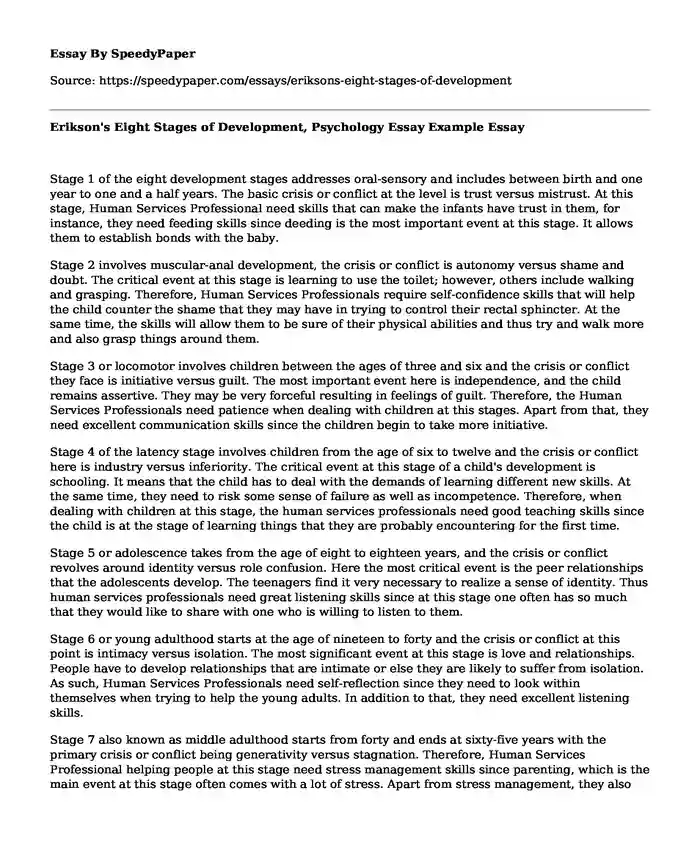
| Type of paper: | Course work |
| Categories: | Human development |
| Pages: | 4 |
| Wordcount: | 844 words |
Stage 1 of the eight development stages addresses oral-sensory and includes between birth and one year to one and a half years. The basic crisis or conflict at the level is trust versus mistrust. At this stage, Human Services Professional need skills that can make the infants have trust in them, for instance, they need feeding skills since deeding is the most important event at this stage. It allows them to establish bonds with the baby.
Stage 2 involves muscular-anal development, the crisis or conflict is autonomy versus shame and doubt. The critical event at this stage is learning to use the toilet; however, others include walking and grasping. Therefore, Human Services Professionals require self-confidence skills that will help the child counter the shame that they may have in trying to control their rectal sphincter. At the same time, the skills will allow them to be sure of their physical abilities and thus try and walk more and also grasp things around them.
Stage 3 or locomotor involves children between the ages of three and six and the crisis or conflict they face is initiative versus guilt. The most important event here is independence, and the child remains assertive. They may be very forceful resulting in feelings of guilt. Therefore, the Human Services Professionals need patience when dealing with children at this stages. Apart from that, they need excellent communication skills since the children begin to take more initiative.
Stage 4 of the latency stage involves children from the age of six to twelve and the crisis or conflict here is industry versus inferiority. The critical event at this stage of a child's development is schooling. It means that the child has to deal with the demands of learning different new skills. At the same time, they need to risk some sense of failure as well as incompetence. Therefore, when dealing with children at this stage, the human services professionals need good teaching skills since the child is at the stage of learning things that they are probably encountering for the first time.
Stage 5 or adolescence takes from the age of eight to eighteen years, and the crisis or conflict revolves around identity versus role confusion. Here the most critical event is the peer relationships that the adolescents develop. The teenagers find it very necessary to realize a sense of identity. Thus human services professionals need great listening skills since at this stage one often has so much that they would like to share with one who is willing to listen to them.
Stage 6 or young adulthood starts at the age of nineteen to forty and the crisis or conflict at this point is intimacy versus isolation. The most significant event at this stage is love and relationships. People have to develop relationships that are intimate or else they are likely to suffer from isolation. As such, Human Services Professionals need self-reflection since they need to look within themselves when trying to help the young adults. In addition to that, they need excellent listening skills.
Stage 7 also known as middle adulthood starts from forty and ends at sixty-five years with the primary crisis or conflict being generativity versus stagnation. Therefore, Human Services Professional helping people at this stage need stress management skills since parenting, which is the main event at this stage often comes with a lot of stress. Apart from stress management, they also need excellent decision-making skills since they need to advise parents on the best approaches to deal with the challenges they may face.
Stage 8 is the final stage, also referred to as maturity starts from the age of sixty-five till death with the central crisis or conflict being integrity versus despair. The most significant event here is a reflection on life as well as acceptance of the life one has led. Human Services Professionals working with such people need spiritual motivation skills to help people in this stage that death is inevitable regardless of whether one feels they led a fulfilling life or not.
Personal Reflection
As I read through the eight stages of human development, I thought about my life and realized that whatever I do today will undoubtedly have an impact on the life that I will live in my later stages of life and particularly the last stage that leads to death. Some of the "ah ha" moments that popped was getting to know that at one point in life one has to reflect on what they have achieved in life and it may lead to despair or fulfillment. However, my concerns about Erikson's technique include the exact years that the various stages begin and end. I feel that people develop at different rates and at varying times. Despite the concern, I am going to start doing the best in my life so that later, in the maturity stage I will not despair when I reflect on my life. Since the concepts are an eye-opener, I would share the same information with my friends and family members so that they get unstuck and start moving towards some meaningful change in their lives.
Cite this page
Erikson's Eight Stages of Development, Psychology Essay Example. (2022, Apr 29). Retrieved from https://speedypaper.net/essays/eriksons-eight-stages-of-development
Request Removal
If you are the original author of this essay and no longer wish to have it published on the SpeedyPaper website, please click below to request its removal:
- HRM Essay Sample: Internal vs External Recruitment
- Free Essay on Project Management Competencies
- Unlock Creative Potential in the Workplace: A Modern Approach
- Significance of the Theme of Social Structure in "Antigone." Paper Example
- Free Essay. Promotion and Resistance of Slavery
- Paper Example. Runaway Climate Change
- Free Essay: Policies and Programs for Children and Families
Popular categories




